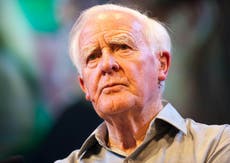Our man on the rock: The untold story of the aristocrat who spied on Germans from a Mediterranean outcrop
Hugh Pakenham Borthwick lived on Fraile and spied on passing German warships and his mission has only come to light thanks to archaeologists, writes Graham Keeley


Archaeologists excavating treasures dating from the fifth century on a tiny island off Spain have also dug up the story of an unsung British spy.
Hugh Pakenham Borthwick lived on Fraile, a speck in the Mediterranean near Aguilas in southeastern Spain during the First World War.
Tall and aristocratic, Borthwick kept a gun under his pillow at night, spent his time making notes of passing German warships and destroyed the paperwork afterwards, according to those who knew him.
Despite living on an island full of archaeological treasures, he showed no interest in its historical richness.
His real interest was not admiring the view out to sea but keeping a close watch for passing German U-boats.
Borthwick, who came from a wealthy Anglo-Scottish family, arrived on the island in 1912, just before hostilities broke out across Europe. He was supposedly part of an engineering expedition.
Before the First World War, British engineering companies arrived in the southeast of Spain to mine iron and other valuable minerals.
When the war broke out, Spain remained neutral but it was a hotbed of spies from both sides.
Borthwick spent his time on Fraile, which measures only six hectares (about eight football pitches) but its rock face is 100 metres high (328ft) , providing it with a conveniently commanding view of the Mediterranean.
Jacqueline Sorel, an amateur historian who is writing a book about Borthwick, said he was recruited by the British secret service when he arrived in Spain.
“He was a spy who kept a lookout for German submarines going up and down the Mediterranean,” she told The Independent.
“He fed his information back to Gibraltar which controlled all the British spies in Spain at the time. There were a considerable number of spies from Germany, Britain and a few from France in Spain at the time.”
Ms Sorel believes after the war Borthwick carried on working as a spy for the British, though he became rich when he inherited his uncle's estate in Southwick, West Sussex.
Alejandro Quevedo, lecturer in Archaeology at the University of Murcia, was part of a team excavating Fraile.
“We discovered a storehouse of Roman amphorae from the fifth century and an Islamic necropolis possibly from the 12th or 13th century. The island has a very rich heritage,” he said.
“The thing is, despite this, Hugh showed no interest at all in that and spent his time taking notes of the German ships which passed.”
During war time, German and British ships would load up consignment of precious minerals at the dockside in Aguilas.
Lurking out at sea were the German submarines waiting to sink the British merchant ships.
Borthwick paid little or no attention to his compatriots who had introduced this part of Spain to football, rugby and tennis and preferred to keep his own company.
Maria Abellan Ruiz, who was 12 when Borthwick lived in Spain, worked as a servant with her mother and grandmother for this mysterious Scottish squire.
Her grandson Jose Asensio, a philologist, released a recording made in 1983 while she was still alive.
“Borthwick did not have anything to do with the English colony here. He spent his time with his newspaper and his correspondence. He was always reading,” she said.
“He received lots of letters but he never kept them, he always destroyed them after reading them.”
She added: “He went to bed early and kept a revolver under the cushion but he was not scared of anything. He never explained why he had the gun.”
Mr Asensio has no doubt that Borthwick was working undercover during his time in Fraile.
“All sorts of stories went about at the time about why he was there; that he was a deserter from the war or that his father, who owned the island, had sent him there because of some disgrace when he was at university,” he said.
“But these were all put about to hide the real reason; that he was spying on the German ships.”
Borthwick's father was an aristocratic landowner from Lothian in Scotland who bought Fraile before the war broke out. His mother was English.
He later took the name of Borthwick-Norton when he married his wife Eva. He died in 1950 in Purbrook in Hampshire.
His widow travelled back to Fraile to find out something about his past but most of the people who knew him at the time had died or did not know anything about her visit.
The Independent tried to reach the Borthwick family for comment but received no response.
Archaeologists from the University of Murcia and the Archaeological Museum of Aguilas are also excavating the ruins of the house where Borthwick lived.
“We expect to find some kind of proof that he was spying here in the ruins,” said Dr Quevedo.



Join our commenting forum
Join thought-provoking conversations, follow other Independent readers and see their replies
Comments